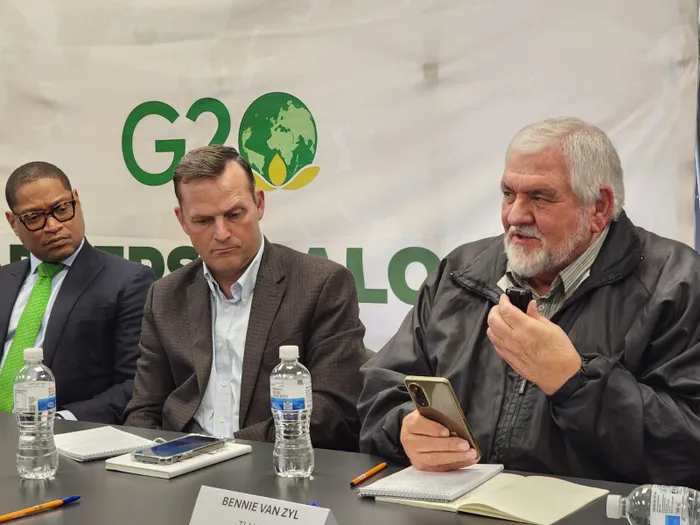Global farmers unite at G20 Dialogue to champion family farming and food security
G20

The Southern Africa Agricultural Initiative (Saai) hosted the G20 Farmers Dialogue at the Faculty of Agricultural Sciences, Stellenbosch University recently.
Image: Supplied by Saai
The Southern Africa Agricultural Initiative (Saai) recently brought together farmers from across the globe, convening the G20 Farmers Dialogue.
The discussions at the Faculty of Agricultural Sciences in Stellenbosch University aimed to forge a path towards a farmers’ declaration for the upcoming G20 Heads of State Summit in Johannesburg in November.
Saai said that the event attracted delegates and digital participants from Europe, North America, Asia, and Africa, ensuring that the authentic voice of farmers was represented in global policy debates.
Saai added that the Dialogue focused on four central themes: family farming; digitalisation, innovation and AI; livestock and proteins; and trade and food security.
Ettore Prandini, President of Coldiretti in Italy, said family farming is crucial.
“Family farmers are the pillars of agriculture globally. They produce most of the world’s food, safeguard biodiversity, and sustain rural communities. Without family farmers, there is no food security, no food sovereignty, no peace,” Prandini said.
Bennie van Zyl, general manager of TLU SA, agreed on the local and global value of family farms.
“Family farming is the backbone of our rural communities and an indispensable link to global food security. Protecting family farms is not just a local matter – it is a global investment in stability, food security, and sustainability,” he said.
AJ Tembu, President of the African Farmers Association of South Africa (AFASA), said that family farmers form the basis of food sovereignty.
“If we lose them, we risk food insecurity on a global scale. Technology must serve to strengthen, not replace, the foundation of family farming.”
Keith Currie, President of the Canadian Federation of Agriculture, said that the importance of technology and AI was crucial for farmers.
“Technology is already here, and farmers want to embrace it. But we need governments to ensure transparency and integrity so that farmers’ data is not misused and their independence is safeguarded,” Currie said.
The dialogue also focused on the future of livestock and animal proteins.
Professor Peer Ederer, chairman of the World Farmers’ Organisation (WFO) Scientific Council, said that several prominent governments are actively reducing food production and limiting exports of animal-sourced foods, even while the world needs more of it.
“This is ideology, not science. Animal source foods are nourishing, not dangerous, and livestock farming done right preserves ecological balance,” Ederer said.
Luigi Scordamaglia, CEO of Filiera Italia - the Italian Agrifood Association - said that lab-grown meat is the opposite of family farming, saying it concentrates power in the hands of a few multinationals.
“We must defend transparency in labelling and protect real farmers’ livelihoods,” Scordamaglia
Carmelo Troccoli, director of the World Farmers Market Coalition, said there needs to be stronger local food systems.
“It is paradoxical that rural areas where food is produced are often the same areas where food insecurity is highest. Farmers must not only produce they must also have the right to sell directly and sustain their communities,” Troccoli said.
Dr Theo de Jager, chairman of Saai, said that farmers from all over the world spoke with one voice.
“In a global food system under pressure from corporatisation, shifting trade regimes, and alternative proteins, family farmers remain the cornerstone of food security and rural life. This Dialogue ensures that the authentic voice of farmers will be heard at the G20 Summit,” De Jager said.
Saai said that across diverse perspectives, a common theme emerged.
“The urgent need to protect the independence, profitability, and sustainability of family farmers in a rapidly changing global environment.”
BUSINESS REPORT